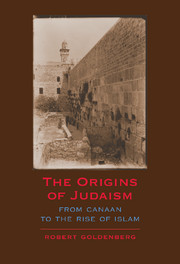Book contents
- Frontmatter
- Contents
- Illustrations
- Acknowledgments
- Abbreviations and References
- A Note of Introduction
- 1 The Prehistory of Judaism
- 2 The Beginnings of Monotheism
- 3 The Book and the People
- 4 Crisis and a New Beginning
- 5 The First Kingdom of Judaea
- 6 Diaspora and Homeland
- 7 A Century of Disasters
- 8 The Rebirth of Judaism
- 9 The Rabbis and Their Torah
- 10 The End of Ancient History
- APPENDIX 1 Three Sample Passages from the Babylonian Talmud
- APPENDIX 2 Rabbinic Biographies
- APPENDIX 3 The Sabbath
- Glossary
- Chronology
- Notes
- Suggestions for Further Reading
- Index
9 - The Rabbis and Their Torah
Published online by Cambridge University Press: 05 June 2012
- Frontmatter
- Contents
- Illustrations
- Acknowledgments
- Abbreviations and References
- A Note of Introduction
- 1 The Prehistory of Judaism
- 2 The Beginnings of Monotheism
- 3 The Book and the People
- 4 Crisis and a New Beginning
- 5 The First Kingdom of Judaea
- 6 Diaspora and Homeland
- 7 A Century of Disasters
- 8 The Rebirth of Judaism
- 9 The Rabbis and Their Torah
- 10 The End of Ancient History
- APPENDIX 1 Three Sample Passages from the Babylonian Talmud
- APPENDIX 2 Rabbinic Biographies
- APPENDIX 3 The Sabbath
- Glossary
- Chronology
- Notes
- Suggestions for Further Reading
- Index
Summary
around the year 200 ce, rabbi judah the patriarch changed forever the character of rabbinic teaching and learning by compiling the Mishnah, the oldest book of rabbinic teaching that survives to modern times. This text, divided into six Orders and subdivided into a total of sixty-three tractates, is half again as big as the Jewish Bible (see “The Contents of the Mishnah”). Each tractate contains a collection of rabbinic teachings on a specific theme, usually a topic of Jewish law. Some of these topics are obviously religious, as modern readers use that term (prayer, festival observances, sacrificial rituals, etc.), others concern ordinary material life (property and damage law, rules of testimony, etc.), and some straddle the boundary between these two realms (marriage, divorce, oaths and vows). The Mishnah did not quite embrace every imaginable aspect of Jewish life, but anyone who had mastered its contents was ready to become a teacher of Torah.
The Mishnah is overwhelmingly concerned with details of Jewish law, but it cannot easily be viewed as a legal code. As “the First Chapter of the Mishnah” shows, there is too much material that a code should not contain: unresolved disputes that give no clear indication of the actual law, stories and interpretations of scripture that have no clear legal point, and so on. It is more likely that the Mishnah was intended to accomplish what it accomplished in fact: the Mishnah became the first known standard training text for rabbinic disciples.
- Type
- Chapter
- Information
- The Origins of JudaismFrom Canaan to the Rise of Islam, pp. 160 - 178Publisher: Cambridge University PressPrint publication year: 2007



